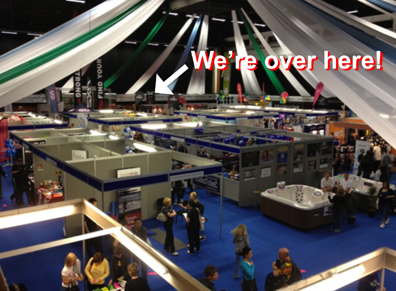I’ve always learnt quicker using analogy, picturing new concepts against familiar ones based on previous experience. So with this in mind, and based on a thirty year career in the events industry this is my attempt to explain Search Engine Optimisation (SEO) and website optimisation against the backdrop of organising an exhibition stand at a trade show.
Whilst working at The Brighton Centre, I’ve seen exhibitors turn up at show with fabulous stands which twinkle and shine. Amazing graphics and multi-coloured carpet tiles; sound effects; scantily clan women pacing around clutching brochures; over enthusiastic sales men and women intimidating the casual passer-by.
I’ve also seen stands which look like they were designed on the back of a packet of fags. Tired graphics; sales staff working hard on reaching the next level of Candy Crush on their phones; chipped and scruffy furniture; last year’s brochures with a sticky label slapped over the date.
So think about your stand (website) from the visitors (users) perspective and you will understand some basic SEO and website optimisation concepts.
Optimise Your Exhibition Stand: Optimise Your website
1. Is it easy to access and find? | Titles, Meta Descriptions & Keywords = SEO
Imagine the exhibition hall is like the internet and the Exhibitor Directory is a search engine. You want visitors to find you so think about your product or services and do your keyword research. Will your entry in the directory (or for the purposes of this analogy, your titles and Meta descriptions) reflect your visitors search terms and mark you out as being a site they want to visit?
Feed your research into Google’s keyword planner tool and see if your keywords deliver the kind of search results you’re after and whether you’re optimising those keywords in your website. The type of keywords you select will determine the potential volume of website visitors – a popular term would be equal to having your stand right at the main entrance of the exhibition hall so that every visitor will see your stand. If you choose a less popular search term you might find that you only have a select few people who had to think about what they wanted. Understand your target audience = SEO
2. If a visitor steps into the stand will they come away with useful information and a commitment to find out more? | Content & Links = SEO
Once on your stand (website) the visitor needs to be able to move easily around the site, gathering information which is relevant and current. Content is King is a tired old adage but it is true so make sure your website has great content and is up to speed. Content = SEO.
Linking to other sources of information will only enhance your visitor experience. If you were working on a stand and a visitor wanted to know more about your credentials or industry knowledge you would be keen to demonstrate this.
Imagine a visitor to the event is sitting at the bar and hears about your stand from another visitor who they respect. If that visitor is saying how great your stand is, they are more likely to want to visit you too. Authoritative links on your website will add to the visitor experience, marking you out as a company who knows their sector and subject thoroughly. Links = SEO.
3. Does your stand really work? | Analytic & Audits = SEO
You might get hundreds of visitors to your stand but no-one contacts you after the show or wants more information. What’s that all about?
Something isn’t working so in the same way that you would review your exhibition performance, you can use Google Analytics to look at your website visitors and their interaction with your site. Website Audit = SEO.
Does the user flow demonstrate any pages where people lose the will to live? Are your action or goals set too deep within the site so no one can find them?
Think back to that last exhibition. Look around you. Are there stands that look better than you and getting more visitors? In the same way that you might approach people working on that stand to find out who designed it and what kind of material they are using, you can use Opensiteexplorer or other competitor analysis tools to interrogate your competitors websites.
Who are they linking to and what sort of keywords are they using? You wouldn’t ignore a competing exhibitor if they were nabbing all your potential visitors, so learn from other sites in the same way. Analytics = SEO.
I once witnessed an exhibition stand where visitors had to take part in quiz before they could get access to the sales area. Inevitably by the end of the first day, with tumble weed circling around the stand, the sales team re-thought that particular approach. Could you be making visitors to your website work too hard to get the information they want?
4. When the exhibition is over how can you still engage with your visitor? | Social Media = SEO
Once the show is over and you are back in the office you would start the process of shifting through the business contacts you collected, usually through some competition or exhibition incentive on the stand.
So think about doing the same thing with Social Media and your website. Engage with your visitors through Facebook and Twitter or Pinterest and Vine. If they could be bothered to find you, engage with your site and take some action (AIDA: Awareness, Interest, Desire, Action) keep them interested in your brand by posting information or news that will not only include them in your product development, but hopefully encourage them to share your tweets and posts amongst their professional circle. By using tools like Followerwonk you can see your competitor’s followers and set about building yours. Social Media = SEO.
Exhibition stands, like websites don’t have to be all singing and dancing to deliver results but there are reasons why companies succeed at one or the other, or both. SEO and website optimisation is simply the way you can apply the lessons learnt around delivering the same great visitor experience you achieved at a live event, to your digital presence on-line.
The SSMM Course at Salford University course is a great way to learn more about SEO, Social Media Marketing and optimisation. Run by the University of Salford the course is taught by Alex Fenton and Aleksej Heinze, two leading exponents of SEO , delivering both practical and theoretical solutions to anyone who wants to know the hows and whys of SEO and Social Media Marketing via effective SEO training.
If you don’t want your website and on-line presence to be in the virtual equivalent of the exhibition stand next to the toilet, book your place on the next course.
Oh, and drop the girls in bikinis…. unless you’re selling bikinis obviously.



